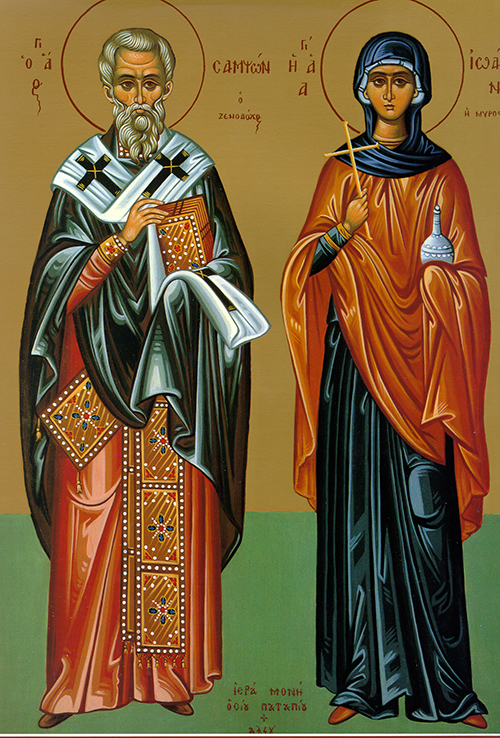

Our venerable father Sampson the Hospitaller was the son of rich and illustrious Roman parents. In his youth he received an excellent education. He studied the medical arts and doctored the sick without charge. After the death of his parents, St. Sampson generously distributed alms and set his slaves free, preparing himself to go into the wilderness. With this intent in mind he soon journeyed from Rome to the East. But the Lord directed him into a different path, that of service to neighbor, and so St. Sampson came to Constantinople. Settling into a small house, the saint began to take in homeless wanderers, the poor and the sick, and he attended to them. The Lord blessed the efforts of St. Sampson and endowed him with the power of wonderworking. He healed the sick not only through being a skilled physician but also as a bearer of the grace of God. News of St. Sampson spread abroad. The patriarch heard of his great virtue and ordained him to the holy priesthood. It was revealed to the grievously ill Emperor Justinian (527-565), that he could receive healing only through St. Sampson. While praying, the saint put his hand on the afflicted area and Justinian was healed. In gratitude, the emperor wanted to reward his healer with silver and gold, but the saint refused and instead asked Justinian to build a home for the poor and the sick. The emperor readily fulfilled his request. St. Sampson devoted the rest of his life to serving his neighbor.
By your patience you reaped your reward, O venerable Father. Your prayers were without end as was your love and solicitude for the poor. Pray to Christ for our salvation, O blessed and merciful Sampson.
You come quickly bearing heaven’s cures like some skillful doctor, O wise Sampson. We have assembled together with songs and chants, desiring to glorify Christ who works these marvels through you.
Romans 9: 6-18
Brothers and sisters: It is not that God’s word has failed. For not all Israelites are true Israelites nor are all Abraham’s descendants his children, but as Scripture says, “Through Isaac shall your descendants be called.” That means that it is not the children of the flesh who are not children of God; it is that children of the promise who are to be considered descendants. And this was the promise: “I will return at this time, and Sarah shall have a son.” Not only that; for when Rebekah had conceived twin children by one man, our father Isaac–while they were yet unborn and had done neither good nor evil, in order that God’s decree might stand fast “not by works but by the favor of him who calls” –God said to her, “The older shall serve the younger.” It is just as Scripture says, “I have loved Jacob and hated Esau.” What are we to say, then? That God is unjust? Not at all! He says to Moses, “I will show mercy to whomever I choose; I will have pity on whomever I wish.” So it is not a question of man’s willing or doing but of God’s mercy. Scripture says to Pharaoh, “This is why I might be proclaimed throughout all the earth.” In other words, God has mercy on whom he wishes, and whom he wishes he makes hardhearted.
Matthew 10: 32-36 & 11:1
The Lord said to his disciples: “Whoever acknowledges me before men I will acknowledge before my Father in heaven. Whoever disowns me before men I will disown before my Father in heaven.
“Do not suppose that my mission on earth is to spread peace. My mission is to spread, not peace, but division. I have come to set a man at odds with his father, a daughter with her mother, a daughter-in-law with her mother-in-law: in short, to make a man’s enemies those of his own household.” When Jesus had finished instructing his twelve disciples, he left that locality to teach and preach in their towns.
Icon courtesy of Jack Figel, Eastern Christian Publications – ecpubs.com
Thursday, June 26 –